

Be the digital change on Oct 3, 2015. iConstitution. #iCit21. Overexposed: Sexting and Relationships. Promoting Digital Citizenship and Academic Integrity. New technology continues to emerge and influence the classroom learning environment.
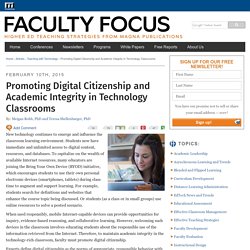
Students now have immediate and unlimited access to digital content, resources, and databases. To capitalize on the wealth of available Internet resources, many educators are joining the Bring Your Own Device (BYOD) initiative, which encourages students to use their own personal electronic devices (smartphones, tablets) during class time to augment and support learning. For example, students search for definitions and websites that enhance the course topic being discussed. Or students (as a class or in small groups) use online resources to solve a posted scenario. When used responsibly, mobile Internet-capable devices can provide opportunities for inquiry, evidence-based reasoning, and collaborative learning.
Develop a preventive classroom environment Developing a preventive classroom helps reduce opportunities for students to engage in academically dishonest endeavors. Increase student awareness. Elementary Tech Alignment: Digital Citizenship. 2014 Recap: 15 Top Resources On Digital Citizenship. Via Edudemic A lot of the facts you teach your students will be long forgotten by the time they reach graduation, but the hope is that the practical lessons — the ones that can benefit them for years to come — are the ones that will stick.
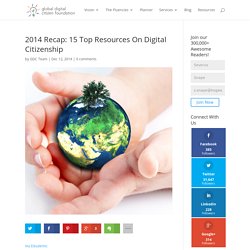
Digital citizenship is something that can equip students for a lifetime of safe, responsible Internet use. How can you mold your students into stand-up digital citizens? Use these resources to help you plan your lessons. The Association of Library Consultants and Coordinators of Ontario. The TALCO Digital Citizenship Project provides an idea bank for teachers to help students establish themselves as knowledgeable and skillful digital citizens, and to use technology for learning in a thoughtful and ethical way.
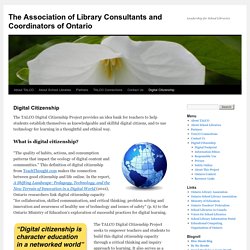
What is digital citizenship? “The quality of habits, actions, and consumption patterns that impact the ecology of digital content and communities.” 13 Tips for Monitoring Kids’ Social Media. The American Academy of Pediatrics (AAP) recently released findings from a comprehensive study on the impact social media has on kids and families.
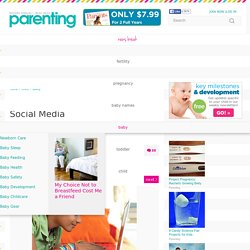
Although there are real benefits to kids using sites like Facebook, including increased communication, access to information and help in developing a sense of self, there can be serious downsides to all this online sharing too. Social networking is on the rise, and the study found that 22 percent of teenagers log onto their favorite social media sites more than 10 times a day, and that 75 percent own cell phones.
This level of engagement online increases the risks of cyberbullying, “Facebook depression” (a new phenomenon where “de-friending” and online bullying lead to symptoms of depression), exposure to inappropriate content, and sexting. Just as we prepare our kids for life in the real world, we should prepare them for life in the online world. Read on for tips that every parent should keep in mind. 9781118213933_sample_419312.pdf. Digital citizenship / Teaching.
Netsafe – Learn Guide Protect The myLGP website supports the Learn Guide Protect Framework .
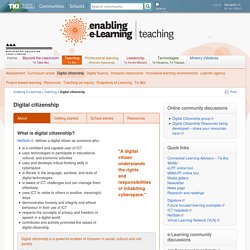
Connected Consulting. Digital citizenship is a broad topic relating to the safe and ethical use of digital tools.
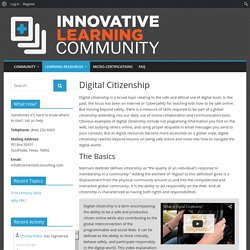
In the past, the focus has been on Internet or Cybersafety for teaching kids how to be safe online. But moving beyond safety, there is a measure of skills required to be part of a global citizenship extending into our daily use of online collaboration and communication tools. Obvious examples of digital citizenship include not plagiarizing information you find on the web, not bullying others online, and using proper etiquette in email messages you send to your contacts.
How You Can Become a Champion of Digital Citizenship in Your Classroom. My students often travel with me when I lead professional development at conferences.
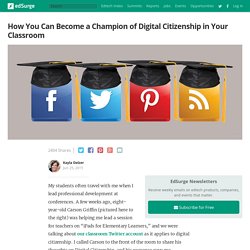
A few weeks ago, eight-year-old Carson Griffin (pictured here to the right) was helping me lead a session for teachers on “iPads for Elementary Learners,” and we were talking about our classroom Twitter account as it applies to digital citizenship. I called Carson to the front of the room to share his thoughts on Digital Citizenship, and his response gave me goosebumps. “You should never post anything negative about a teacher, coach, or others on social media because they could find it and you will feel foolish,” he said.
“If my coach doesn’t play me in soccer, I should not post bad stuff about them. I could be kicked off the team.” But he didn’t stop there. I’m not sure if it was the teachers’ reactions, the fact that he so beautifully recited this during the summer, or that I know I helped him secure his future in second grade that made this such a powerful moment for everyone in the room. LAND: Digital Literacy/Examples. Following are types of projects which would be considered appropriate for the LAND Digital Literacy Competition.
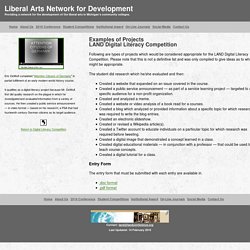
Please note that this is not a definitive list and was only compiled to give ideas as to what might be appropriate. The student did research which he/she evaluated and then: Created a website that expanded on an issue covered in the course. Created a public service announcement — as part of a service learning project — targeted to a specific audience for a non-profit organization. Created and analyzed a meme.
Entry Form The entry form that must be submitted with each entry are available in. Digital Literacy -Web 2.0. For this project, you will work in a collaborative team to create a public service announcement about cyberbullying.
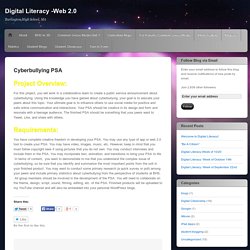
Using the knowledge you have gained about cyberbullying, your goal is to educate your peers about this topic. Your ultimate goal is to influence others to use social media for positive and safe online communication and interactions. PSA Project - Digital Literacy. Is your school’s “digital citizenship” practice a pass or fail? Cc licensed ( BY ) flickr photo shared by Walmart Corporate This past week, I worked with a small group of educators on becoming a “Networked Educator“, and we had some great conversations about how social media is changing a lot of what we do in schools.
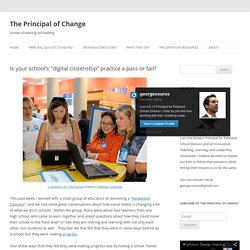
Within the group, there were about four teachers from one high school, who came to learn together and asked questions about how they could move their school to the “next level” in how they are sharing and learning with not only each other, but students as well. They told me that felt that they were in some ways behind as a school, but they were making progress. One of the ways that they felt they were making progress was by having a school Twitter account to share what is happening at with their community. This is new to them and they are learning along the way, but the teachers admittedly felt that the school needed to do more to help their students.
They didn’t like it at all. Do I ever swear? Digital Literacy and Citizenship Curriculum – Know your web – Good to Know – Google. At Google we believe in the power of education and the promise of technology to improve the lives of students and educators -- leading the way for a new generation of learning in the classroom and beyond. But no matter what subject you teach, it is important for your students to know how to think critically and evaluate online sources, understand how to protect themselves from online threats from bullies to scammers, and to think before they share and be good digital citizens.
Google has partnered with child safety experts at iKeepSafe, and also worked with educators themselves to develop lessons that will work in the classroom, are appropriate for kids, and incorporate some of the best advice and tips that Google's security team has to offer. Class 1: Become an Online Sleuth In this class, students will identify guidelines for evaluating the credibility of content online. We are always looking to improve these classes. Digital Literacy across the Curriculum handbook.
This handbook introduces educational practitioners to the concepts and contexts of digital literacy and supports them in developing their own practice aimed at fostering the components of digital literacy in classroom subject teaching and in real school settings. The handbook is aimed at educational practitioners and school leaders in both primary and secondary schools who are interested in creative and critical uses of technology in the classroom. Although there is increasing policy and research attention paid to issues related to digital literacy, there is still relatively little information about how to put this into practice in the classroom.
There is even less guidance on how teachers might combine a commitment to digital literacy with the needs of their own subject teaching. How can digital literacy be fostered, for example, in a maths or science lesson? This handbook is also supported by case studies of digital literacy in practice which can be downloaded here. Lesson Plans and Curriculum. Digital Literacy & Citizenship Classroom Curriculum.
NEW! Learn the fundamentals of digital citizenship through choose-your-own-adventure interactive experiences DIGITAL COMPASS - Where are you headed? The only educational game that gives kids the freedom to explore how decisions made in their digital lives can impact their relationships and future. Bring a blended-learning approach to teaching digital citizenship DIGITAL BYTES teaches teens digital citizenship through student-directed, media-rich activities that tackle real-world dilemmas. Teens learn from peers' experiences then create collaborative projects that voice their ideas for making smart choices online. SWGfL Digital Literacy - Home. Digital Citizenship Week: 6 Resources for Educators. Considering how ubiquitous smartphones and tablets have become, especially in high school and middle school, questions about managing use and educating students about digital etiquette are on a lot of educators' minds.
This October, Common Sense Media is sponsoring Digital Citizenship Week from October 16 to October 22. And we wanted to pull together some of the best resources to help educators talk about digital responsibility and safety online. Here, you'll find resources that cover today's digital landscape, ideas for student activities, and strategies for engaging parents. There are plenty of valuable resources for educators and parents to share, but here are six of my favorites: InCtrl - Lesson: Digital Citizenship.
Online Survival Kit. Create Your Own Digital Citizenship Survival Kit. Here's a practical hands on tool kit shared on Craig Bandura's blog he calls The Digital Citizenship Survival Kit. It's an excellent way to use physical prompts and metaphorical thinking to help kids understand how to behave ethically online. While Craig uses this kit with students in kindergarten through Grade 8 it'll work well with students of any age. I've included Craig's original list of items and a few other suggested by people who commented on his blog. I've also added a few of my own nuances and additional resources for teachers to use with their students. Digital-Citizenship-Toolkit.pdf. Digital Survival.
Untitled. Digital Citizenship Toolkit : EGUSD Digital Citizenship. Digital Citizenship. Download Digital Citizenship Toolkit - Presentations from Official Microsoft Download Center. Important! Selecting a language below will dynamically change the complete page content to that language. Digital Citizenship Toolkits. Comfortably 2.0: The "New and Improved" Digital Citizenship Survival Kit. I have been thinking about some "new" items I could add to my original Digital Citizenship Kit that I created last year. Like I said in that blog post, I love using props when teaching. After some great conversations with the good wife @jenbadura on what I should include, I have come up with some new items to include in the survival kit. Yes, you can use this with your students! After I blogged about the original kit, I had a plethora of teachers email me or send me a tweet me asking if it was okay to use this idea at their school.
Technology / Digital Citizenship Curriculum. Elementary Digital Citizenship - Home. Digital Passport by Common Sense Media. Hectors World - Silicon Deep - Introduction and Navigation. — iKeepSafe Kids. Training Missions - The Carnegie Cyber Academy - An Online Safety site and Games for Kids. The training missions at the Academy teach cadets about cybersecurity topics, such as email threats and website safety. Cadets earn a unique Gold Badge for completing a training mission. After entering the game, the cadets can locate the training missions at various buildings in Cyberspace.
Once a cadet has their Cyberspace Pass from Commander Omni, they are free to complete the missions in any order. Currently four missions are available to registered cadets: Cadets must recognize and filter out the spam from the good email. Earn the Email Level 1 Gold Badge: Download the Hint Sheet for tips for identifying spam emails: Video and Media. Webonauts Internet Academy. Come play again later! Are you a responsible digital citizen? Learn the Ropes on Digital Citizenship - For Kids & Teens...Sites. Skip to main content Create interactive lessons using any digital content including wikis with our free sister product TES Teach. Get it on the web or iPad! Guest Join | Help | Sign In. Digital Citizenship k-6. How to Use Social Media as a Learning Tool. Social media is an ingrained part of today’s society. Our students are constantly on Instagram, Facebook, Twitter, and likely many sites we’re not hip enough to know about, and by reading this blog, you’re interacting with social media at this very moment.
If you want to bring the “real world” into the classroom, consider integrating social media into your lessons. Class-2_Manage-your-digital-reputation_FINAL.pdf. Digital Citizenship Spotlight Lesson Plans. Digital Citizenship Lessons / Digital Citizenship. Why do we need to teach Digital Citizenship Lessons? Chavez Bill, AB307 – Signed into law in 2006Amended Section 51871.5 of the Ed. Code, relating to educational technology Ed Code 51871.5, sections a-e: Technology PlansSection c – Tech Plan must include how teachers and students will be educated about:Appropriate and ethical use of information technologyInternet safetyHow to avoid committing plagiarismCopyright - to distinguish lawful from unlawful online downloading; implications of peer-to-peer network file sharing KCUSD's Technology Plan for 2010-13 addresses the Ed Code, Section c listed above.
Teachers will be teaching students lessons developed by KCUSD grade level teachers on copyright, plagiarism, and Internet safety. Digital_Citizenship_in_New_Zealand_Schools_Overview.pdf. Greenwich Public Schools: Digital Citizenship: A Project-Based Activity. SWGfL Digital Literacy - Curriculum Overview. The Strategy for Digital Citizenship. Innovative Learning Resources – Digital Citizenship. 12%20Ways%20to%20Kick%20off%20Digital%20Citizenship%20in%20your%20School%20Community.pdf. Digital Citizenship / Curriculum. Curriculum: Understanding YouTube & Digital Citizenship – Google in Education. 3 ways to weave digital citizenship into your curriculum. Alignment and Standards. Google Digital Literacy and Citizenship Curriculum.
EN_curriculum.pdf. Haiku Learning : Tech Time Digital Citizenship Curriculum : Home: Student Lessons. Digital Citizenship in schools. Digital Citizenship Poster for Middle and High School Classrooms. Nine Elements. DIGCI2-excerpt.pdf. Cybersmart - Internet and mobile safety advice and activities: Cybersmart.
Digital Citizenship. We help BUSY Adults Keep Kids Safe Online. Www.digitalcitizenship.net/uploads/FoundAct2.pdf. Cyber Safety - Digital Footprint. Your Digital Footprint Matters. A Great Guide on Teaching Students about Digital Footprint. 5. Digital Footprint. Pipl - People Search.
Spokeo People Search. Supporting Students to Take the Lead on Digital Tattoo. Jason ohler : Home. Thing 18: Digital Tattoo & Digital Citizenship (2013 version) Rtsdigitaltattoo.pdf. What is a digital tattoo? Digital Citizenship: Resource Roundup. 15 Sites and Apps Kids Are Heading to Beyond Facebook. Social Media, Tweens, and Teens: Pointers for Parents. Think Before You Post. Digital Citizenship - Kids Internet Safety. Sites/mediasmarts/files/pdfs/tipsheet/TipSheet_Think_Before_You_Share.pdf. Digital Citizenship / Cyberbullying - Keystone Area Education Agency. Character Building - Digital Citizenship Education.